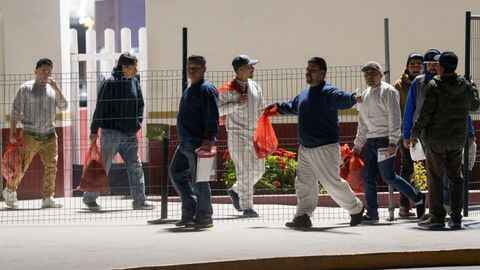The migrants came from ten nations, most of which were in Asia: China, Pakistan, Afghanistan, India, Nepal, Sri Lanka, Iran, and others.
Nearly 300 individuals from different nations who were deported under US President Donald Trump are being held in a Panamanian hotel, preventing them from leaving until international authorities arrange for their repatriation.
Authorities claim that over 40% of the migrants will not willingly return to their country of origin. The words “Help” and “We are not safe (sic) in our country” were written on the windows of the hotel rooms where the migrants were staying.
The migrants came from ten nations, most of which were in Asia: China, Pakistan, Afghanistan, India, Nepal, Sri Lanka, Iran, and others.
Some of those countries are difficult for the US to deport directly to, so Panama is being used as a stopover.
A similar flight of deportees from third countries was scheduled to arrive in Costa Rica on Wednesday.
As part of a migratory deal between the US and Panama, the migrants are getting food and medical care, according to Panama’s Security Minister Frank Abrego on Tuesday.
Now, the US is paying for the entire program, and the Panamanian government has agreed to act as a “bridge” or transit nation for deportees. Following the visit of US Secretary of State Marco Rubio earlier this month, the agreement was made public.
Restrictions
Trump’s threats to retake the Panama Canal have put political pressure on Panamanian President Jose Raul Mulino, who last Thursday announced the arrival of the first of the deportation planes.
Concern has been raised in the Central American nation by the deportees’ imprisonment and legal limbo, particularly as pictures of migrants peeking through the windows of their high-floor hotel rooms and holding notes begging for assistance have gone viral.
Abrego disputed that the foreigners are being held despite being unable to leave their hotel’s police-guarded rooms.
According to a brego, 171 out of the 299 deportees have consented to voluntarily return to their home countries with assistance from the UN Refugee Agency and the International Organization for Migration.
The remaining 128 migrants are being contacted by UN agencies in an attempt to find them a third-country destination. According to Abrego, one Irish national who was deported has already made her way back home.
According to Abrego, those who refuse to go back to their home countries would be detained in a facility in the isolated Darien province, which has seen hundreds of thousands of migrants pass through on their way north in recent years.
Later on Tuesday, the Panamanian Ombudsman’s Office was supposed to give additional information about the deportees’ circumstances.






